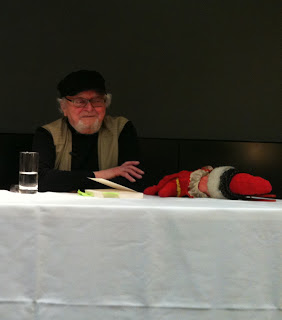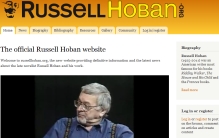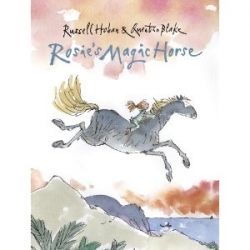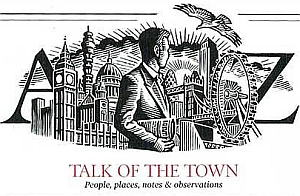 |
| Russell Hoban and Mr Punch |
SA4QE was lucky to get a front-row seat on Monday night at John Mullan's Guardian Book Club interview with Russell Hoban.
There were some 125 people in attendance at the Guardian's Scott Room, where Hoban spoke to Mullan and answered questions from the audience for about 90 minutes on Riddley Walker.
Dressed in a black roll-neck and beige bodywarmer, Hoban took to the stage with help from his wife Gundula to warm applause. He doffed his black baseball cap and as Mullan did his introductions Hoban rummaged in a bag for a Mr Punch puppet, extemporising a few Punchisms in authentic voice to everyone's delight.
SA4QE didn't get a recording or formal notes of the interview (unlike for the somewhat shorter Serpentine gig last month), and it was being recorded for a future Guardian podcast anyway, but fortunately several of Hoban's beautifully-crafted answers were almost exact quotes from an article he wrote for the Guardian Book Club (to be published in the print edition on Saturday 27 November). 'People say to me: "Where do you get your ideas?" "Out of the air,"' was among Hoban's replies, as was his reference to 'the place where the remembered blood of Thomas Becket seethes on the stones' during an account of first visiting Canterbury Cathedral and seeing The Legend of St Eustace.
SA4QE, not being a Riddley expert (we leave that to the formidable Eli Bishop and his RW Annotations website), admits it was unaware of the fact that St Eustace 'has no official standing among the beatified. Perhaps his legend turned up on the back of some Middle-Ages cornflakes box and grew from there. Being thus non-factual, Eustace is quite at home in a work of fiction.' Hoban talked awhile about the poor St Eustace, recounting his separation from his children before finally landing up roasted alive in a brazen bull, checking at one point with Mullan if he was 'spending too much time on this'. Mullan, as captivated as the rest of us, bade him carry on as long as he wished.
Mullan read out some of the place names Hoban gave to actual Kent locations in Riddley Walker (Do It Over for Dover, Horny Boy for Herne Bay etc), querying where 'Bollock Stoans' was. 'I don't remember that one,' Hoban replied, adding something to the effect that 'a certain amount of bollocks' was involved. Another Mullan question revolved around the character Abel Goodparley's misinterpretation of the story of St Eustace, asking Hoban to read out the passage in question. Hoban explained that his eyes don't allow him to read very well these days, so Mullan read it out instead ('St stands for 'sent', meaning he dint jus turn up, he was sent' was among the well-received quotes from the book).
A question about how Mr Punch came into things produced one of several excellent lines of the night, Hoban asserting that his ability to write what and how he writes lies in a facility for 'being friends with my head ... I take its hobo journeys in fast freights, riding the blinds to unknown destinations. Sometimes I get thrown off the train in the middle of nowhere and sometimes I get to the Big Rock Candy Mountain.' One of these journeys evidently took in Punch and Judy, and thankfully Hoban was good enough friends with his own head (what a delightfully Orphic image!) to take that ride and connect Punch with St Eustace to produce the unique work we know today.
There followed a further 40 minutes' fascinating patter, during which Hoban gave some eloquent - if sometimes unnervingly brief - answers, touching on the language of Riddley Walker - 'it slows the reader down to Riddley's pace of thought and the language itself becomes a character in the novel' - and on why people feel drawn to the book despite its apocalyptic mood. Hoban's paraphrased answer to the latter revolved around the perennial attraction to ghost and horror stories as well as to the idea of characters at the very extremes of existence. 'I believe Cormac McCarthy has done something similar recently with a book called The Road,' Hoban added - to, frankly, the relief of SA4QE which understood from past exchanges that the great man studiously avoided contemporary fiction.
 |
| John Mullan |
'I've been asking myself what is it with the dogs [said Hoban about the book's famous canines]. It's first off, the blackness of them. [I'm addicted to black.] I'm a schwartzophile. I based the dogs on the physiognomy of the hyena. They're not tail-waggy things.'
'Punch is the lawless id, the spirit of rebellion that Riddley digs up. It's the dead hand.'
Q: 'What's your philosophical position?' A: 'All my books are an exploration. The action comes out of the characters and the characters come out of the action.'
One questioner asked at some length how Hoban reconciled writing his Frances series ('my one commercial success') and other books for children with the dark adult fantasy of Riddley Walker. Hoban's explanation gave rise to what will probably be Hoban's best-remembered line of the night: 'I believe it's called talent.' If almost any other writer had said this they would have been roasted in a brazen bull for it, but it seemed more matter-of-fact than arrogant and even a non-Hoban fan could hardly argue with it - SA4QE is of course biased, but the body of work speaks for itself.
 |
| Russell Hoban signs for Roland and his class |
There were a number of other questions which will have to wait for the podcast, but the final one was sent in by Kate Laity on Twitter - 'Is it possible to have such a varied career as yours today?' Hoban responded, refreshingly without cynicism: 'Talent will always find a way.'
Several of SA4QE's friends were also in attendance, including Tim Haillay, Deena Omar (forever known as the 'Some-Poasyum quiz winner'), Alastair Bickley, Richard Cooper and Bristol Grammar School's Roland Clare, who had brought eight upper-sixth English students with him. Roland's former students Rowan Evans, who pinned a Riddley quote to a tree on a former 4qation, and Thomas Lipscomb also came with the party on a fabulous day trip which had taken in Riddley-themed sessions at the British Library. SA4QE is pleased to report that the Bristolians were interviewed later as part of the Guardian podcast about their studies of the book - this can be heard about 21 minutes into the audio file on this page.
Altogether it was a fantastic evening, and SA4QE thanks the excellent folks at The Guardian, including of course John Mullan as well as Claire Armitstead, Hannah Freeman and Justine Jordan for enthusiastically tweeting about it.
 |
PHOTOS BY GOMBERT YAWNCHER Hi-res versions are available as a set on the SA4QE Flickr site |









 On 4 February 2012 the Slickman A4 Quotation Event celebrated
On 4 February 2012 the Slickman A4 Quotation Event celebrated 


 In 2005 the first international convention for Russell Hoban fans took place in London, and was marked by the publication of a fantastic 48-page booklet featuring exclusive contributions from innumerable fans and associates including novelist David Mitchell and actress Glenda Jackson. A wonderful memento of the event, it's also a beautiful collector's item and must-have for any Hoban fan. Although in limited supply, copies of the booklet are still available at £6.00 each plus p&p. Order direct from
In 2005 the first international convention for Russell Hoban fans took place in London, and was marked by the publication of a fantastic 48-page booklet featuring exclusive contributions from innumerable fans and associates including novelist David Mitchell and actress Glenda Jackson. A wonderful memento of the event, it's also a beautiful collector's item and must-have for any Hoban fan. Although in limited supply, copies of the booklet are still available at £6.00 each plus p&p. Order direct from  Russell Hoban turned 86 on 4 February 2011 and fans celebrated in traditional style by leaving quotes from his books in public places. Browse their quotes
Russell Hoban turned 86 on 4 February 2011 and fans celebrated in traditional style by leaving quotes from his books in public places. Browse their quotes  To celebrate 30 years in print of Russell Hoban's most famous novel
To celebrate 30 years in print of Russell Hoban's most famous novel 






No comments:
Post a Comment
Note: only a member of this blog may post a comment.